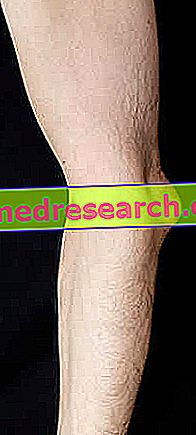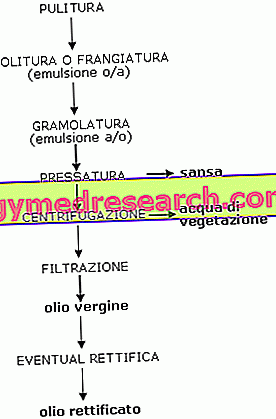Definition
The term "hirsutism" refers to excessive and unregulated growth of hair, hard and thick, in women, in typically male anatomical sites such as abdomen, upper lip, back, nipple areola, etc. Hirsutism assumes the connotation of " virilism ”when, in addition to the growth of hair where they are normally absent, the woman also shows other signs of masculinization.
Causes
The distribution of down, in the context of hirsutism, varies according to several elements: alteration of the hormonal axis (consequence of polycystic ovary syndrome, increase in testosterone and insulin, menopause), intake of some drugs (Minoxidil for the treatment of alopecia, corticosteroids, androgens, progestins, anabolic steroids), defect of adrenal enzymes and genetic predisposition. Sometimes the cause is not identifiable.
Symptoms
Hirsutism gives no symptoms but exaggerated growth of hair in places where it should not be; in general, the condition begins with the growth of the hair at the level of the chin, upper lip, around the nipples and in the sideburn area. As we age, hirsutism favors the appearance of hair also on the back, on the abdomen, on the chest (central part), on the shoulders.
The information on Hirsutism - Drugs for the Care of ICS does not intend to replace the direct relationship between health professional and patient. Always consult your doctor and / or specialist before taking Hirsutism - Drugs for the treatment of irsutism.
drugs
Hirsutism can be treated in different ways, depending on the origin of the disorder; when, for example, the overgrowth of hair is associated with acne, the administration of hormones could keep both pimples and hair growth in check.
In the case of obesity associated with hirsutism, the patient should follow a hypocaloric and balanced diet : this simple provision could create a modest effect also in terms of control and containment of the growth of hair, given that the weight reduction reflects a decline in levels of androgens. It is believed that even constant exercise can have a positive effect on hirsutism, decreasing the production of androgens and improving the metabolic picture.
We have also seen that hirsutism can also be influenced by an alteration in the synthesis of insulin; therefore, the control of blood glucose and a possible therapy for the treatment of diabetes could resolve, at least in part, this unpleasant condition.
Clearly, there are some treatments aimed exclusively at controlling hair, which do not, however, directly affect the cause: shaving, hair removal, waxing and innovative laser hair removal techniques can be very valid practices to improve the aesthetic appearance and remove the psychological distress, especially for young girls.
Electrolysis also plays an important alternative to hide hirsutism: this practice acts on the hair follicle, destroying it thanks to an energy source capable of generating heat inside the hair.
When hirsutism is accompanied by obvious signs of masculinization, it is advisable to perform interosurgery, which consists in removing the hyperproductive organ.
- Eflornithine (eg Vaniqa): available as a cream for topical application; it is an antiprotozoal drug, capable of inhibiting the production of the ornithine-decarboxylase enzyme in hair follicles, implicated in hirsutism; the application of the product in the areas affected by hirsutism reduces the hair growth, especially on the face, to a greater or lesser extent. Apply a thin layer of cream on the face affected by hirsutism, twice a day, exercising a light massage to favor absorption. The treatment should generally last for 4 months, in which most of the time there is an evident improvement in symptoms.
- Ethinylestradiol and Cyproterone Acetate (anti-androgen drug): indicated to treat hirsutism associated with acne. The administration of this hormonal combination seems to be very effective in treating hirsutism: the effects exerted by excess "male" hormones are balanced by this product, so as to decrease the synthesis of testosterone by the ovary. In general, hirsutism improves markedly after 6-12 months after taking the contraceptive pill. Cyproterone acetate is sometimes associated with 17-Beta-Estradiol
- Spironolactone (eg Spirolang, Aldactone, Uractone): is an anti-androgen / diuretic drug used to monitor hair growth and keep it under control. It is recommended to take a dose of drug ranging from 50 to 200 mg / day orally, once a day or by splitting the dosage twice.
- Medroxyprogesterone acetate (eg Farlutal, Provera, Premia): it is a progestin drug capable of inhibiting the androgens synthesized at the level of the ovaries, responsible for hirsutism. It is available as 10-20 mg active ingredient tablets; the dosage should be determined by the doctor.
- Ketoconazole (eg. Nizoral): apply the product in the form of a cream on skin affected by hirsutism, once or twice a day, as prescribed by the doctor. Ketoconazole is however a second-line drug for the treatment of hirsutism; in general, it is used to treat seborrheic dermatitis. Do not use the drug if cortisone drugs have been used in the two preceding weeks.
- Cimetidine (eg Biomag, Tagamet): inhibits the secretion of hormones produced at peripheral level (not at cortical level); carries out its therapeutic activity through a competitive receptor mechanism for androgens (without hormonal effects). This drug is however widely used in therapy for ulcer care.
- Finasteride (eg Prostide, Proscar): performs its action against hirsutism by blocking the activity of the 5-alpha reductase enzyme. Treatment with this drug increases testosterone values, decreasing DHT (Dihydrotestosterone, the active metabolite of testosterone). Do not take during pregnancy: the drug is a teratogen. Indicatively, the recommended dose is 5 mg a day: the efficacy against hirsutism (at this dose) is comparable to that exerted by spironolactone (100 mg / day). Dosage modification is a medical competence.
- Metformin (eg Metforal, Diaglimet, Metbay, Dialinax): indicated for the treatment of hirsutism in the context of polycystic ovary syndrome. The drug is particularly indicated for obese or overweight women, diabetics and those suffering from hirsutism: the drug, increasing insulin sensitivity, promotes weight reduction, regulates the menstrual cycle (generally altered in these cases) and improves in a way significant hirsutism. For the dosage: consult your doctor.



